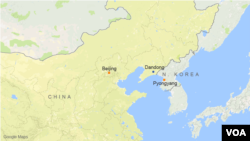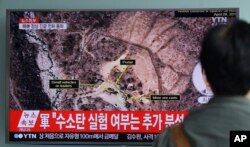The United States has announced criminal charges and economic sanctions against a Chinese company for alleged support of North Korea’s nuclear weapons program.
Dandong Hongxiang Industrial Developmental Company Limited (DHID), as well as its chairwoman Ma Xiaohong and three top executives, were charged with conspiring to evade sanctions against North Korea, including by facilitating money laundering through U.S. financial institutions.
DHID also is under investigation by Chinese authorities for its connection with Kwangson Banking Corporation, a North Korean bank suspected of financing Pyongyang’s nuclear weapons program. Ma Xiaohong was detained by Chinese authorities last month.
“This shows we can work cooperatively with China; we both see it in our interests to apply greater pressure on North Korea,” said State Department deputy spokesperson Mark Toner on Monday.
Toner added it’s necessary to take actions to “maintain the integrity of sanctions imposed by the United Nations and by the United States” when North Korea continues to disregard international obligations.
Kwangson Banking Corporation was previously designated by the U.S. and United Nations for providing financial services in support of North Korea’s weapons proliferation.
In a coordinated move, the Justice Department charged Dandong Hongxiang employees with using dozens of fake businesses and bank accounts to evade U.S. sanctions on North Korea's nuclear and weapons program. At the same time, the Treasury Department froze the assets of the company and its employees, including 25 bank accounts and 21 alleged front companies.
“The charges and forfeiture action announced today allege that defendants in China established and used shell companies around the world, surreptitiously moved money through the United States and violated the sanctions imposed on North Korea in response to, among other things, its nuclear weapons program,” said Assistant Attorney General Leslie Caldwell.
Last week, Chinese authorities said they were investigating Hongxiang, based in Dandong, a northeastern city on the North Korean border. Police and China's foreign ministry said the company was suspected of unspecified "serious economic crimes.'' That was an unusually explicit announcement for Beijing, whose dealings with the North are shrouded in secrecy.
China signed on in March to the stiffest U.N. sanctions yet that limit trade with the North. It has tightened controls on cross-border flows of goods, but that hasn't allayed suspicions that North Korea still can conduct illicit business through China. U.N. Security Council resolutions prohibit nuclear weapons development by the North and all ballistic missile activity.
“We have been earnestly and faithfully implementing Security Council resolutions related to North Korea in their entirety and fulfilling our international obligations in non-proliferation export controls,” said spokesperson Geng Shuang on Monday.
International concern about Pyongyang's nuclear and missile programs is deepening following its fifth and largest atomic test this month, its second this year. That's fueling worries that North Korea is moving closer to its goal of a nuclear-armed missile that could one day strike the U.S. mainland.
A defiant North Korea Foreign Minister Ri Yong Ho defended Pyongyang’s ballistic and nuclear programs, questioning the legitimacy of the United Nations Security Council resolution that imposed sanctions against North Korea.
“The United States has no more qualifications to force U.N. member states to implement this undeserved resolution while the member states have no moral obligation to implement this unfair and unjust resolution,” said Ri in New York last week.






